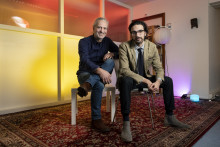A women’s circle is a space for women to gather in a community in order to learn, share and connect. ‘The idea behind is to drop the usual small talk we are all daily exposed to, and connect with each other on a deeper level,’ shares Julia Piedmont.
Why did you start this project?
Piedmont: ‘As a psychologist, I have experience with people in many different areas, some of them involving people with mental illnesses, and what I’ve learnt is that the approach of claiming to be an expert is not always necessarily helpful. What helped me, when I was experiencing personal and social issues, was people being truly present around me, connecting with them and feeling empathy from the other side. The essence of the Women`s Circles lies precisely in these values.'
'I found that there is a lot of healing and growth'
‘The one thing that we really have in common and look for in these gatherings is the connectedness, and we achieve that by sharing deep emotions, ideas and thoughts. While sharing is a key element for building a circle, the participants certainly do not have to disclose their innermost worlds. A participant should not answer questions or feel pressured to talk in a professional way. The circle is about feeling comfortable with emotions and picking up on other people’s emotions as we talk. I found that there is a lot of healing and growth in a setting like this rather than a usual psychologist-client relationship since hearing other people’s stories generates inspiration. Everyone is welcome without judgment.’
Why only women?
‘In no regards we are feminists or anti-men, however we discuss very sensitive topics like sexuality, the female body, self-acceptance, boundaries and fears. These are very intimate matters and for a lot of women it feels safer to discuss them only with other women. There are undeniable physiological and biological differences between men and women and therefore a difference in understanding how we deal with our problems. When only women are present there are no instincts acting in the subconscious mind and hence no need to impress anybody. That feeling creates a safe space for exploring how to value yourself, take care of yourself and how to set your boundaries as a woman.’
‘This practise has been around since thousands of years ago, when women used to gather in a tribal setting to exchange the traditions and wisdom that kept them alive and healthy and it continues to be valuable in a modern context, where we have an ever more urgency for deep connection.’
How can this setting help international students deal with stress?
‘Being a student means constantly being under pressure that you need to perform well. There are many ways in which women’s circles can help students cope with mental and social issues, but one of the leading factors is the creation of an environment, where nothing is truly expected from an individual. Particularly when it comes to international students, being separated from their most trusted environments – friends, family and facing the responsibilities of living alone can lead to severe stress and depression.'
'Being a student means constantly being under pressure'
‘It could be very difficult for internationals to deal not only with the high-demands of the university, but also with their own personal peace of mind. Through exploring topics rooted in all of us and realizing that other people have similar problems or even utilizing their solutions is where the circles come to an aid. Meetings like this can create deep connections and friendships. Because the nature of real connection requires time to delve into important topics, it could be hard to surpass the small talk and open up straight away without the support of a community.’
students' opinion
Helena Gautvik Tronstad, international student from Saxion: ‘I feel very included, because this is a place, where you can really be whoever you want to be and say things which might not be appropriate in other settings throughout the day. For me it is a way to reconnect with myself and be reminded of what is important for my wellbeing and the one of others, too. Sometimes I walk out of this circles with completely new realisations about my life.’
Anna-Maria Stoynovska, international student from the psychology department at the UT: ‘It is a great community, in which I feel free to just lie down on the carpet and listen to others or I can say something not necessarily related to the weekly topic and I would not be judged about that. People here hold a positive regard towards each other and that allows everyone to set free and share things close to their hearts.’








